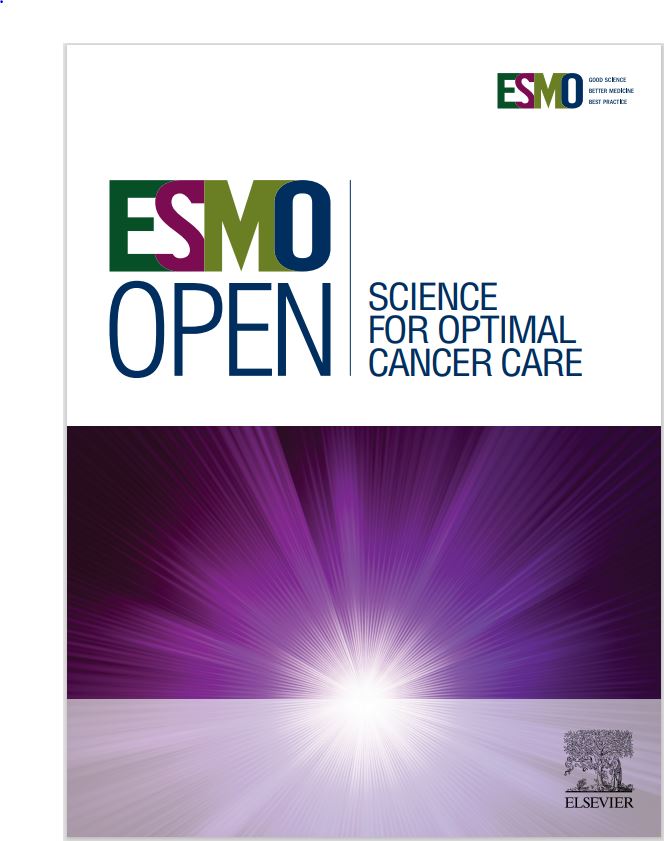胰腺癌诊断、治疗和随访的泛亚ESMO临床实践指南。
IF 8.3
2区 医学
Q1 ONCOLOGY
引用次数: 0
摘要
欧洲肿瘤医学学会(ESMO)胰腺癌患者诊断、治疗和随访临床实践指南于2023年11月发布,根据先前建立的标准方法,于2024年12月进行了修改,以制定泛亚改编(PAGA) ESMO共识指南,用于亚洲胰腺癌患者的管理。本手稿中提出的改编指南代表了由ESMO和新加坡肿瘤学会(SSO)协调的亚洲胰腺癌患者治疗专家小组达成的共识意见,这些专家代表了中国(CSCO)、印度尼西亚(ISHMO)、印度(ISMPO)、日本(JSMO)、韩国(KSMO)、马来西亚(MOS)、菲律宾(PSMO)、新加坡(SSO)、台湾(TOS)和泰国(TSCO)的肿瘤学会。投票以科学证据为基础,独立于亚洲不同区域目前的治疗做法、药物获取限制和报销决定。后者在手稿中单独讨论。目的是利用西方和亚洲试验提供的证据,为亚洲不同国家胰腺癌患者管理的优化和协调提供指导。提请注意不同国家在药物批准和报销战略方面的差异。本文章由计算机程序翻译,如有差异,请以英文原文为准。
Pan-Asian adapted ESMO Clinical Practice Guidelines for the diagnosis, treatment and follow-up of patients with pancreatic cancer
The European Society for Medical Oncology (ESMO) Clinical Practice Guidelines for the diagnosis, treatment and follow-up of patients with pancreatic cancer, published in November 2023, were adapted in December 2024, according to previously established standard methodology, to produce the Pan-Asian adapted (PAGA) ESMO consensus guidelines for the management of Asian patients with pancreatic cancer. The adapted guidelines presented in this manuscript represent the consensus opinions reached by a panel of Asian experts in the treatment of patients with pancreatic cancer representing the oncological societies of China (CSCO), Indonesia (ISHMO), India (ISMPO), Japan (JSMO), Korea (KSMO), Malaysia (MOS), the Philippines (PSMO), Singapore (SSO), Taiwan (TOS) and Thailand (TSCO), co-ordinated by ESMO and the Singapore Society of Oncology (SSO). The voting was based on scientific evidence and was independent of the current treatment practices, drug access restrictions and reimbursement decisions in the different regions of Asia. The latter are discussed separately in the manuscript. The aim is to provide guidance for the optimisation and harmonisation of the management of patients with pancreatic cancer across the different countries of Asia, drawing on the evidence provided by both Western and Asian trials. Attention is drawn to the disparity in drug approvals and reimbursement strategies between the different countries.
求助全文
通过发布文献求助,成功后即可免费获取论文全文。
去求助
来源期刊

ESMO Open
Medicine-Oncology
CiteScore
11.70
自引率
2.70%
发文量
255
审稿时长
10 weeks
期刊介绍:
ESMO Open is the online-only, open access journal of the European Society for Medical Oncology (ESMO). It is a peer-reviewed publication dedicated to sharing high-quality medical research and educational materials from various fields of oncology. The journal specifically focuses on showcasing innovative clinical and translational cancer research.
ESMO Open aims to publish a wide range of research articles covering all aspects of oncology, including experimental studies, translational research, diagnostic advancements, and therapeutic approaches. The content of the journal includes original research articles, insightful reviews, thought-provoking editorials, and correspondence. Moreover, the journal warmly welcomes the submission of phase I trials and meta-analyses. It also showcases reviews from significant ESMO conferences and meetings, as well as publishes important position statements on behalf of ESMO.
Overall, ESMO Open offers a platform for scientists, clinicians, and researchers in the field of oncology to share their valuable insights and contribute to advancing the understanding and treatment of cancer. The journal serves as a source of up-to-date information and fosters collaboration within the oncology community.
 求助内容:
求助内容: 应助结果提醒方式:
应助结果提醒方式:


